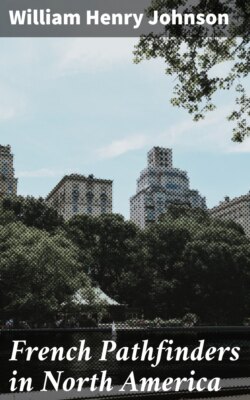Читать книгу French Pathfinders in North America - William Henry Johnson - Страница 13
На сайте Литреса книга снята с продажи.
ACHIEVEMENTS OF FRENCHMEN
IN THE NORTH OF AMERICA
ОглавлениеTable of Contents
The Difference between Spanish and French Methods.—What caused the Difference.—How it resulted.
A singular and picturesque story is that of New France. In romantic interest it has no rival in North America, save that of Mexico. Frenchmen opened up the great Northwest; and for a long time France was the dominant power in the North, as Spain was in the South. When the French tongue was heard in wigwams in far western forests; when French goods were exchanged for furs at the head of Lake Superior and around Hudson Bay; when French priests had a strong post as far to the West as Sault Ste. Marie, and carried their missionary journeyings still further, who could have foreseen the day when the flag of republican France would fly over only two rocky islets off the coast of Newfoundland, and to her great rival, Spain, of all her vast possessions would remain not a single rood of land on the mainland of the world to which she had led the white race?
At the period with which we are occupied these two great Catholic powers seemed in a fair way to divide North America between them. Their methods were as different as the material objects which they sought. The Spaniard wanted Gold, and he roamed over vast regions in quest of it, conquering, enslaving, and exploiting the natives as the means of achieving his ends. The Frenchman craved Furs, and for these he trafficked with the Indians. The one depended on conquest, the other on trade.
Now trade cannot exist without good-will. You may rob people at the point of the sword, but to have them come to you freely and exchange with you, you must have gained their confidence. Further, there was a deep-lying cause for this difference of method. Wretched beings may be worked in gangs, under a slave-driver, in fields and mines. This was the Spanish way. But hunting animals for their skins and trapping them for their furs is solitary work, done by lone men in the wilderness, and, above all, by men who are free to come and go. You cannot make a slave of the hunter who roams the forests, traps the brooks, and paddles the lakes and streams. His occupation keeps him a wild, free man. Whatever advantage is taken of him must be gained by winning his confidence.
Thus the object of the Frenchman's pursuit rendered necessary a constantly friendly attitude toward the Indians. If he displeased them, they would cease to bring their furs. If he did not give enough of his goods in exchange, they would take a longer journey and deal with the Dutch at Albany or with the English at their outlying settlements. In short, the Spaniard had no rival and was in a position allowing him to be as brutal as he pleased. The Frenchman was simply in the situation of a shopkeeper who has no control over his customers, and if he does not retain their good-will, must see them deal at the other place across the street.
There is no doubt that this difference of conditions made an enormous difference between the Spanish and the French attitude toward the Indians. The Spaniards were naturally inclined to be haughty and cruel toward inferior races, while the French generally showed themselves friendly and mingled freely with the natives in new regions. But the circumstance to which attention has here been called tended to exaggerate the natural disposition of each. Absolute power made the Spaniard a cruel master: the lack of it drove the Frenchman to gain his ends by cunning and cajolery.
The consequence was, that while the Spaniard was dreaded and shunned, and whole populations were wiped out by his merciless rule, the Frenchman was loved by the Indians. They turned gladly to him from the cold Englishman, who held himself always in the attitude of a superior being; they made alliances with him and scalped his enemies, white or red, with devilish glee; they hung about every French post, warmed themselves by the Frenchman's fire, ate his food, and patted their stomachs with delight; and they swarmed by thousands to Quebec, bringing their peltries for trade, received gewgaws and tinsel decorations from the Governor, and swore eternal allegiance to his master, the Sun of the World, at Versailles.
In a former volume, "Pioneer Spaniards in North America," we have followed the steps of Spain's dauntless leaders in the Western World. We have seen Balboa, Ponce, Cortes, Soto, Coronado, making their way by the bloody hand, slaying, plundering, and burning, and we have heard the shrieks of victims torn to pieces by savage dogs.
In the present volume quite other methods will engage our attention. We shall accompany the shrewd pioneers of France, as they make their joyous entry into Indian villages, eat boiled dog with pretended relish, sit around the council-fire, smoke the Indian's pipe, and end by dancing the war-dance as furiously as the red men.
